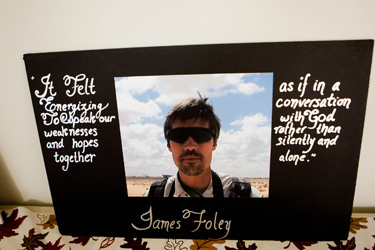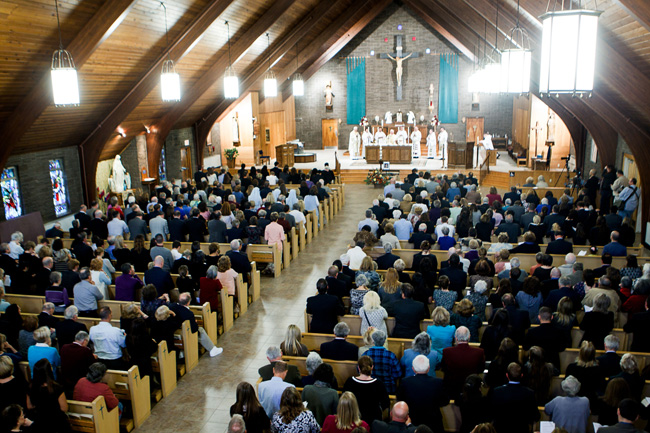
A photo of slain New Hampshire journalist James Foley is displayed during an Oct. 19 memorial Mass celebrated at Our Lady of the Holy Rosary Church in Rochester, N.H. (CNS photo/Donis Tracy, Pilot)
ROCHESTER, N.H. (CNS) — Close to 1,000 of slain journalist James Foley’s closest friends and family gathered at Our Lady of the Holy Rosary Church in Rochester Oct. 19 for a memorial Mass to celebrate the life of the man who was killed by Syrian extremists on Aug. 19, but whose legacy lives on.
Foley was captured in northwest Syria, along with British journalist John Cantlie, in November 2012 by Shabiha militia, a group loyal to Syrian President Bashar Assad. For two years, the family prayed for his safe return.
On Aug. 19, the Islamic State extremist group uploaded a video to YouTube entitled “A Message to America.” In it, Foley was decapitated, and the killers threatened to execute more journalists — a threat that was fulfilled when journalist Steven Sotloff was murdered only two weeks later. Cantlie remains a prisoner.
Placed just inside the front doors of the Rochester church Oct. 19 was a memory wall — a display of some of Foley’s photographs through the years, as well as mementos of his life, including the manuscript of a novel he was writing. Many of Foley’s friends and family stood before the memory wall and shared memories of trips taken, of laughs shared, of moments now treasured.
[hotblock]
Quietly, they filed into the church as Foley’s parents, John and Diane, sat with their four children in the front pew of the packed church to celebrate the life of a son and brother.
In a homily marked with examples in which Foley lived out the beatitudes, Father Marc Montminy, pastor of St. Michael Parish in Exeter and close family friend, noted that Foley, who started out as an educator, working among impoverished communities through the Teach for America program, turned to journalism as a way to tell the stories of people in need.
“Today would have been Jimmy’s 41st birthday,” he said. “In these 41 years, Jim played a pivotal role in the lives of so many.”
Father Montminy described Foley as, “an American journalist, a video reporter, an instructor in Teach for America, a friend, a son, a brother … a hero.”
“It was people’s stories — stories of mechanics, of oil workers, mother and fathers. People living in the extremes,” he said, that were the driving force behind Foley’s mission.
Everything changed, Father Montminy continued, when in 2011 Foley and three other journalists — Clare Gillis, Anton Hammerl and Manu Brabo — were attacked in Libya by pro-Gadhafi forces. Helpless, Foley watched as his friend Hammerl was killed. The other three were captured and held as prisoners for 44 days.
“All did change for Jim at that point,” Father Montminy stressed. “He wanted to see justice and peace. Blessed are the peacemakers.”
After being released in May 2011, Foley returned to his home in Rochester, but seven months later began a series of trips to northern Syria as a freelance journalist working for GlobalPost, Father Montminy recounted.
“(Foley) became ever more captivated by the goodness of the Syrian people,” Father Montminy said. “It was because of that goodness, he wanted to do something. He wanted to report the truth, so that the entire world would know what was happening.”
He said Foley was always sustained “by a deep faith” throughout his ordeals.
“It was this faith that gave Jimmy, over the years, the capacity to believe when no one else was able to,” he said. “He understood the importance and the power of a relationship with a God that perhaps he had not known so well, but that he had come to know much better in the midst of his suffering and pain. Blessed are the pure of heart, for they shall see God.”
Father Montminy praised the Foley family, noting that their suffering never turned into despair.
“Your grief has been soaked in hope, and that’s what Jim’s life was all about,” he said. “Your witness of faith is the greatest gift and legacy that you can give your son who taught us not only that you can live with conviction and purpose, but also how to die as a hero.”
“He walked a dark journey at times. Perhaps even a dark night of the soul at the end. But when he stood before those who would take his life, he stood in hope. He stood in strength, with dignity,” continued Father Montminy.
“Happy Birthday, James,” he concluded.
Before Mass concluded, three family members delivered eulogies: An aunt and uncle, Rita and Fernando Colina, and Foley’s younger brother by two years, Michael, who noted everyone at Mass had gathered “to celebrate a life worth living, a life lived to the fullest, and one that has left a permanent impression on those he has touched.”
“Jim was different from most people,” Michael said. “He had a combination of qualities that you don’t often find. Jim put others before himself. He did this consistently throughout his life.”
As the oldest of the five siblings, James Foley was always teaching them, “whether or not we were willing to learn,” Michael said.
“His final lesson came in the form of his act of martyrdom,” he added. “Jim died for his faith. He died because he was American. He represented the core values we stand for. He died so others may live.”
***
Tracy is a correspondent for The Pilot, newspaper of the Boston Archdiocese.
PREVIOUS: Former secretary says St. John Paul II shared his flock’s sorrows, joys
NEXT: EPA’s Clean Power Plan draws interest from Catholic organizations




Share this story